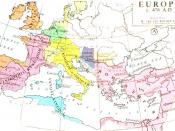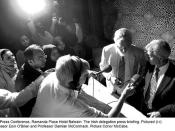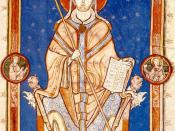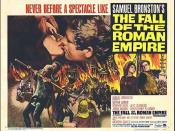How the Irish Saved Civilization a book by Thomas Cahill is referred to as the untold story of IrelandÃÂs heroic role in the advancement of western culture, from the decline of the Roman Empire until the European dark ages. The main point of this book is to offer a different viewpoint on the little known role that the Irish contributed to the survival of civilization, as we know it. This book offers a very persuasive argument about IrelandÃÂs role in the preservation of ancient literature. It appears that Mr. Cahill decorates the known facts of the era and interjects his own viewpoints continuously throughout the book. Another minor flaw is how the author associates western civilization as civilization in general. It is also difficult to argue that the Irish were solely responsible for saving civilization, especially without persuasively showing that books had become extinct in the intervening 150 years (Eyore, 2).
There is little doubt, after reading this very informative book, the Irish played a significant role in the preservation of western civilization, but when Mr. Cahill asserts that the Irish ÃÂSingle-handedly re-founded European civilization throughout the continentÃÂ one senses a touch of hyperbole (Bernstein, 2).
During the explanation of the fall of the Roman Empire, it is said that apathy and a general feeling of superiority ultimately lead to the demise of Roman rule. Mr. Cahill suggests that the Romans lived such a wonderful life, and had such a lax policy on what was required to become a Roman citizen, that they became too diluted, and eventually the Roman army consisted of people who were primarily immigrants, so to speak. It is without doubt that the sheer size of the empire was the primary cause of its demise, since the borders were very difficult to enforce, yet he focuses more on the cultural issues and credits those same issues for the fall of the empire. He also points out that the authentic Roman citizens felt they were too good to serve in the army, thus leading to an army consisting of people who were commissioned to fight the very tribes they used to belong to. Generally, he seems to be accurate in reference to the fall of the Roman Empire.
After the author elaborates on the fall of the Roman Empire, he introduces St. Augustine of Hippo and offers his viewpoint of AugustineÃÂs contributions to literature. He asserts that Augustine is the first person to write with conscious thought. Until this time, it is said, no other author had ventured into this type of prose. He calls Augustine the first memoirist and the father of the novel (Spievogel 183). There is little doubt that AugustineÃÂs contributions to civilization were vast, seeing as how he was probably one of the most important theologians of all time, but to put them on par with St. Patrick seems to be a reach (Eyore 2). St. PatrickÃÂs contributions were important, he essentially single handedly converted the whole of Ireland. The primary reason the Irish were so attracted to the message that St. Patrick was preaching is the fact that it offered a more peaceful, tranquil outlook on the world with a loving and forgiving God. It is also noted that the Irish lived in constant fear of death without cause, and they worshiped shape changing, vicious bloodthirsty gods who were believed to cause mayhem even when unprovoked. As anybody would imagine, after living in constant fear your whole life the message that St. Patrick brought would be welcomed with open arms. Once St. Patrick had begun the movement of Ireland, he began to teach. Eventually, because of his work there were many monks who devoted their life to copying books, poems, epics and all other sorts of literature. Within one generation the Irish had developed their own version of the alphabet, and of written language. The Irish had become so thirsty for knowledge that they continued copying everything they could get their hands on. This love for learning is one of the differences between the Roman Catholic religion and that of the Irish monks. Eventually the Irish monks came out of their monasteries and began re-educating all of Europe.
One thing about the Irish is that once they had been given the ability of learning, they found it impossible to restrict themselves only to religious literature. The Celtic Christian spirituality was very different from the Roman Catholic spirituality in that the Irish were much less disciplined in certain areas of their beliefs. An example of this is confession. According to the Celtic Christian spirituality, a person is absolved of sin just by admitting he as sinned and accepting Jesus Christ as their savior (McCloskey 1). The Roman Catholic can only have their sins forgiven if they confessed to a priest and followed the proper protocol. The Celtic Christians appeared to be less of a ÃÂslaveÃÂ to their religion, so to speak than the Roman Catholics. ThatÃÂs to say that they did not entirely let go of some of their pagan influences that made them Irish. An example of this would be Halloween. They continue to celebrate other pagan holidays to this day.
Ultimately IrelandÃÂs contribution to western civilization cannot be minimized, if for no other reason than their unending devotion and love of all literature and their contribution to making certain that some of the greatest works of all time would not be lost. I feel that Mr. Cahill is a very engaging author, and did a wonderful job of masking the relatively unknown role of the Irish in the quest of preserving the literate world as the single most important event in the civilized world. However, I have a very hard time agreeing that they were solely responsible for saving civilization itself, considering that western civilization is not the be all and end all of civilization. I believe that his neglect in mentioning the Chinese, Japanese and even the civilization in the Yucatan Peninsula contribute to the bias he exhibits towards the IrishÃÂs role, and as much as we all like to believe we are the center of the universe, the Irish are simply not responsible for saving civilization. The Irish sure built some really cool libraries though, didnÃÂt they?Works Cited1.ÃÂ Book Review: How the Irish Saved civilization.ÃÂ Pat Friend, 2000-2005, All About Irish, Sept. 25, 2007, 2.ÃÂ How the Irish Saved Civilization.ÃÂ Father John McCloskey, 1996-2007, Catholicity.com, Sept. 25, 2007, 3.ÃÂ Thomas Cahill-How the Irish Saved Civilization.ÃÂ Eyore, 1999-2007, epinions.com, Sept. 25, 2007, 4.ÃÂ Who Saved Civilization? The Irish, ThatÃÂs Who.ÃÂ Richard Bernstein, Apr 5, 1995, nytimes.com, Sept. 25, 2007, 5.Spielvogel, Jackson. Western Civilization 6th Edition. Thompson Wadsworth, 2006.
Thesis Statement:How the Irish Saved Civilization a book by Thomas Cahill is referred to as the untold story of IrelandÃÂs heroic role in the advancement of western culture, from the decline of the Roman Empire until the European dark ages. The main point of this book is to offer a different viewpoint on the little known role that the Irish contributed to the survival of civilization, as we know it.





